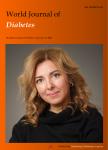Impact of chronic disease self-management programs on type 2 diabetes management in primary care
Impact of chronic disease self-management programs on type 2 diabetes management in primary care作者机构:Department of Family and Community Medicine Baylor Scott and White Health College of Medicine Texas A&M Health Science Center Department of Epidemiology and Biostatistics School of Rural Public Health Texas A&M Health Science Center Department of Health Promotion and Community Health Sciences School of Rural Public Health Texas A&M Health Science Center Department of Health Policy and Management School of Rural Public Health Texas A&M Health Science Center
出 版 物:《World Journal of Diabetes》 (世界糖尿病杂志(英文版)(电子版))
年 卷 期:2014年第5卷第3期
页 面:407-414页
学科分类:1002[医学-临床医学] 100201[医学-内科学(含:心血管病、血液病、呼吸系病、消化系病、内分泌与代谢病、肾病、风湿病、传染病)] 10[医学]
基 金:Supported by The National Institutes of Health’s National Institute on Minority Health and Health Disparities No.#1P20MD002295
主 题:Type 2 diabetes Self-management Chronic Disease Self-Management Program Glycemic control Glycated hemoglobin Chronic disease
摘 要:AIM: To assess the effectiveness of the Chronic Disease Self-Management Program(CDSMP) on glycated hemoglobin A1c(HbA1c) and selected self-reported ***: We compared patients who received a diabetes self-care behavioral intervention, the CDSMP developed at the Stanford University, with controls whoreceived usual care on their HbA1c and selected self-reported measures, including diabetes self-care activities, health-related quality of life(HRQOL), pain and fatigue. The subjects were a subset of participants enrolled in a randomized controlled trial that took place at seven regional clinics of a university-affiliated integrated healthcare system of a multi-specialty group practice between January 2009 and June 2011. The primary outcome was change in HbA1c from randomization to 12 mo. Data were analyzed using multilevel statistical models and linear mixed models to provide unbiased estimates of intervention ***: Demographic and baseline clinical characteristics were generally comparable between the two groups. The average baseline HbA1c values in the CDSMP and control groups were 9.4% and 9.2%, respectively. Significant reductions in HbA1c were seen at 12 mo for the two groups, with adjusted changes around 0.6%(P 0.0001), but the reductions did not differ significantly between the two groups(P = 0.885). Few significant differences were observed in participants diabetes self-care activities. No significant differences were observed in the participants HRQOL, pain, or fatigue ***: The CDSMP intervention may not lower HbA1c any better than good routine care in an integrated healthcare system. More research is needed to understand the benefits of self-management programs in primary care in different settings and populations.



